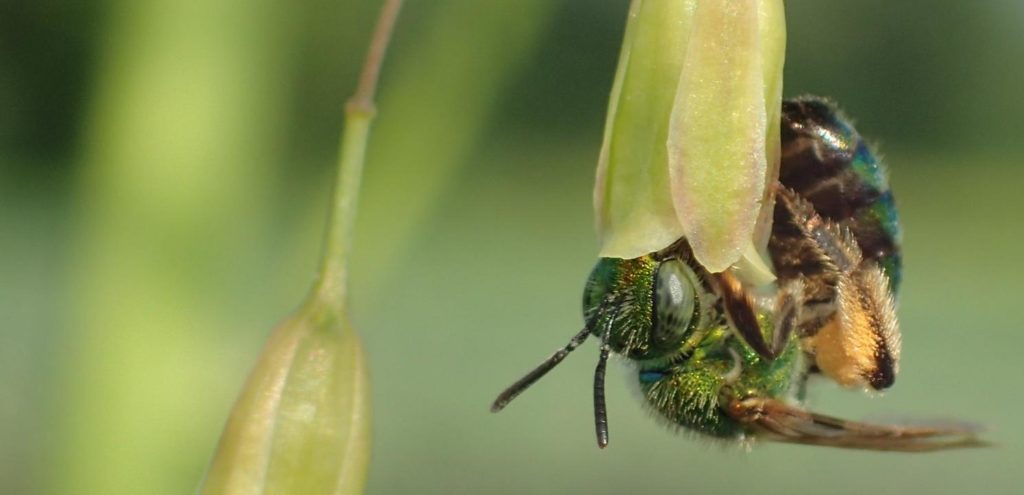Hastings Stewardship Council invites you to the 2019 Winter Speaker Series starting on Thursday, January 24, from 7 to 9 pm at the Huntington Veterans Community Hall, 11379 Highway 62, in Ivanhoe. The entrance fee of $5.00 per person, a donation – or a sponsorship – helps cover costs. Children are free.
For more information, contact Ray Wellman at (613) 848-7697, infohastingsstewardship.ca or check hastingsstewardship.ca.
You can watch Susan Chan’s presentation on Native Bees in Ontario.
February 28: Buildings and their role in causing and reversing climate change – Chris Magwood
Chris Magwood will present the latest information on energy efficient building and materials and some background about the Endeavour Centre and the Endeavour Sustainable Building School which occupies a unique position in the green building world. “We provide experiential education at the intersection of high-performance and natural building,” said Magwood.
Biography Chris Magwood is obsessed with making the best, most energy efficient, beautiful and inspiring buildings without wrecking the whole darn planet in the attempt.He co-founded “Camel’s Back Construction”, and over eight years helped to design and/or build about 20 homes and a few commercial buildings, mostly with straw bales and often with renewable energy systems. He co-authored three books on straw bale construction:. He was also the editor of The Last Straw Journal, an international quarterly of straw bale and natural building.
He now brings this experience and passion to his role as curriculum developer and instructor at Endeavour. He loves working with learners and collaborating with professionals and newcomers alike to create remarkable buildings and communities.Chris was awarded the 2008 Excellence in Education Award by the Canada Mortgage and Housing Corporation (CMHC). He was named a Canadian Eco-Hero by Harrowsmith Magazine. He has won numerous design and teaching awards, including a Home Sweet Home Award for Affordable Housing. Chris is an active speaker and workshop instructor in Canada and internationally.
March 7: From Earthstars to Destroying Angels: An introduction to mushrooms and other fungi – Richard Aaron
Mushrooms occur in a mind-boggling variety of colours, shapes and sizes, many of which look nothing like those found in supermarkets. While some are edible and others poisonous, the vast majority are just plain interesting.
In this richly illustrated talk, “From Earthstars to Destroying Angels: An introduction to mushrooms & other fungi,” Richard Aaron will share stories about a host of intriguing species found right here in Southern Ontario, from mushrooms that glow in the dark to a puffball that can produce over seven trillion spores! Along with tales of charismatic and eye-catching fungi, Richard will delve into the vital roles that fungi play in maintaining healthy ecosystems.
Biography
Richard’s interest in the natural world took root more than three decades ago while on a summer-long, 6,500 km bicycle tour of Ontario, Quebec and the Maritimes. Since then, he has done walks, talks and workshops for over 90 organizations, including naturalist clubs, nature festivals, conservation groups, land trusts, and academic institutions (natureknowledge.weebly.com), including a stint as an Algonquin Provincial Park staff naturalist. His main areas of interest are wildflowers, trees, fungi, slime moulds, dragonflies & damselflies, moths, ecology, biomimicry, and the etymology of scientific names.
He has written for Seasons magazine and his column, Beyond Words (about the meanings of nature words), ran for five years in Nature Canada magazine. On the citizen science front, Richard founded the High Park Moth Study (2016-current; Toronto) and co-founded the Rouge Park Odonate Survey (2010-13; Scarborough, Ont.).
Richard began studying fungi in earnest in 1994. He is best known for the perennially popular Fabulous Fall Fungi public workshops he teaches each fall at Queen’s University Biological Station (https://qubs.ca).
March 14: Algonquin Wild – Michael Runtz
Michael Runtz has spent more than five decades exploring Algonquin Park. This presentation, based on his newest book, is a visual extravaganza that explores the natural history of this world-famous park through the four seasons.
“My presentation, Algonquin Wild, is a visual exploration of the changes in Algonquin Park’s flora and fauna through the course of a year,” notes Runtz. “Highlights include elusive orchids and carnivorous plants, and little-known snow insects in addition to the more famous large animals such as wolves and moose.”
Biography Michael Runtz, an avid birdwatcher since the age of five, has spent decades exploring Algonquin Park by canoe and foot, and has worked there as an interpretive naturalist in Algonquin for a total of 11 seasons spanning four decades. Additionally, Michael has written more than 1,000 newspaper and magazine natural history articles, including his current weekly column Nature’s Way. Michael hosted the international television series Wild by Nature, and currently teaches at Carleton University where his highly visual teaching style has attracted more than 50,000 students to his natural history courses.
Michael has received numerous awards including the Council of Canadian University, Biology Chairs Distinguished Public Science Education Award and the Carleton University Lifetime Achievement Award. A popular keynote speaker and a regular guest on radio and television, Michael was the only Canadian featured in the TVO/NHK Japan 2001 Superteachers series that profiled such notables as Jane Goodall and Nelson Mandella.
March 28: Birds and your backyard habitat – Doug McRae
Doug McRae, avid naturalist and conservationist, will explain how to attract and identify birds near home, and how you can enhance backyard habitat to make a safe place for birds and wildlife. Doug has worked in research, education and conservation settings that include 20 years of guiding birding tours world-wide, and ten years working on a shorebird research study.
Biography
Doug McRae has been an avid naturalist and conservationist since childhood. He has worked in various research, education and conservation settings over the years. These include spending 20 years guiding birding tours world-wide, and working on a shorebird research study for the past ten years at remote field camps along the James Bay coast. He is also involved in habitat acquisition, protection and management through his work with the Lone Pine Land Trust, which owns five properties totalling 450 acres on the Cold Creek watershed.
Doug’s talk will be about how to attract and identify birds near home, and how you can enhance backyard habitat to make a safe place for birds and wildlife.
January 24: Native Bees in Ontario: Introduction, Challenges, and Action – Susan Willis Chan
When it comes to flowers, field crops, fruit and vegetables, our native bees are the workhorses of the pollinator world. Find out more on January 24, when bee advocate Susan Willis Chan will present an intriguing story of diversity, starring our native bees. After years of bee research and field work, Susan has many photos to share and stories to tell about bee behaviour and the services bees provide to our backyards and farm crops.
Native bees are facing big challenges in agricultural environments. Susan will explain the foraging scenarios provided by farm crops, and the purposeful pollinator habitat created by farmers and others. The effects of insecticide exposure on bees, as well as pesticide exposure routes will be detailed.
Biography As past program manager at Farms at Work, Susan has worked with many landowners to help create and preserve healthy habitat for native bees and other natural pollinators. Susan will share some new scientific information from her own bee research. She is now working full time on her Ph.D. She teaches Sustainable Agriculture at Trent University. Susan holds a B.Sc. (Agriculture) from McGill University, M.Sc. Environmental Biology (Pollination) from the University of Guelph, and B.Ed. from the University of Western Ontario.
February 7: Lyme Disease: protecting yourself, dealing with a bite and treatment options – Dr. Brenda Tapp ND
Dr. Tapp will discuss:Ticks: where they live, how to identify themhow to protect yourself from a biteother means of transmission of Lyme diseasewhat to do when you have a bitehow to remove a tickthe symptoms of acute Lyme disease and chronic Lyme diseaseco-infections that can be passed with Borrelia burgdorferi bacteriatesting available for Lyme disease andtreatment options, both pharmaceutical and naturopathic
Biography Dr. Brenda Tapp ND is a naturopathic doctor and Clinic Director of the Peterborough Centre of Naturopathic Medicine. While Dr. Tapp’s primary focus is cancer, she also treats such complex chronic health conditions as chronic Lyme disease. Dr. Tapp has completed two medical brigades, one to Haiti and one to Nicaragua. She has won several local business awards including the 4-Under-40 business excellence award, twice. Dr. Tapp is a member of the Oncology Association of Naturopathic Physicians.
February 14: Woodlands, Wetlands and Citizen Science – Dr. Dianne Saxe
On November 13, 2018, the Environmental Commissioner of Ontario released her 2018 Environmental Protection Report, Back to Basics, to the Ontario Legislature. The report calls on the provincial government to limit water pollution, commit funding towards programs that protect municipal drinking water sources, as well as increase the protection of wetlands, woodlands, and wildlife across the province.
Dr. Saxe will focus on the loss of forests and wetlands and the growing importance of citizen science. Dr. Saxe says wetlands and woodlands continue to be damaged by agriculture and development. Basic ecosystem function requires 30 per cent forest cover, and some parts of Ontario have only three per cent left. Three quarters of southern Ontario’s wetlands have been lost. Wildlife diseases can have critical impacts on biodiversity, human health and the economy. “Small changes can better protect Ontario’s water, wetlands, woodlands and wildlife,” concluded Saxe. “My report offers sensible solutions. Many cost relatively little and would yield big rewards.”
Biography Dr. Dianne Saxe is the Environmental Commissioner of Ontario (ECO), a tough but fair watchdog over Ontario’s environmental, energy and climate performance, and guardian of the Environmental Bill of Rights (EBR). Prior to her appointment in December 2015, Commissioner Saxe was one of Canada’s most respected environmental lawyers. A Certified Environmental Law Specialist, Commissioner Saxe was recognized in every Canadian and international legal rating service, including acknowledgement as one of the world’s top 25 environmental lawyers by Best of the Best, 2008 and as Best Lawyers’ first Environmental Lawyer of the Year for Toronto. Some of her numerous tributes and honours include the Award for Distinguished Service, the highest honour granted by the Ontario Bar Association, and the Gold Key Award for exceptional lifetime professional achievement, granted by Osgoode Hall Law School Alumni.




